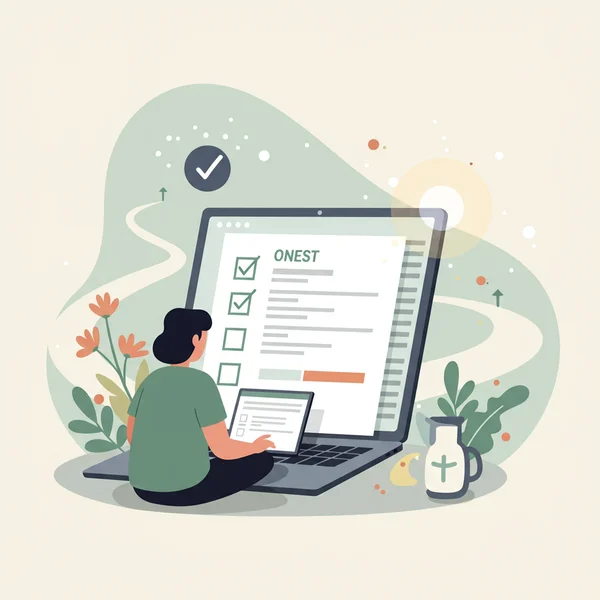Interpreting Your Asperger's Test Score & Next Steps
August 4, 2025 | By Jasper Finch
You've completed your online aspergers test, and now you have a score—a moment that often brings questions and a desire for clarity. What should I do after getting my Asperger's test results? This is a common and important question. This guide is here to help you demystify that number, understand what it signifies on your path to self-knowledge, and explore the valuable next steps you can take. Consider this score a significant milestone, not the end of your journey, but a valuable starting point for deeper self-understanding.
Taking a screening is a proactive step towards self-awareness. Whether you were prompted by a lifetime of feeling slightly different or a specific curiosity about your social interactions, the results are a starting point. They provide a data point on your personal map. Let’s explore how to read that map and where it can lead you. If you haven't taken the test yet, you can start your journey here.

Understanding Your Online Asperger's Test Results
An online test score can feel definitive, but its true value lies in its context. It's less of a verdict and more of a signpost. To interpret it correctly, it's essential to understand the foundation of the test and what the score is designed to reflect. This is a key part of using an adult aspergers test effectively.
The Science Behind Our Asperger's Test Evaluation
Your trust is paramount, and it begins with transparency. Our assessment is not arbitrary; it is built upon established and scientifically validated screening tools. Our questionnaire is adapted from renowned clinical instruments like the Autism-Spectrum Quotient (AQ) and the Ritvo Autism Asperger Diagnostic Scale-Revised (RAADS-R). These are the same types of tools that researchers and clinicians use to gather preliminary information.
These scales are designed to measure the presence of traits commonly associated with the autism spectrum in adults. By grounding our test in this research, we ensure that your score is a reliable indicator, providing a solid foundation for self-reflection. It’s a scientific approach to begin your journey of self-understanding.
What Our Asperger's Test Score Represents
Your score is a quantitative summary of your responses. It reflects the degree to which your experiences align with common traits of Asperger's syndrome, now more broadly understood as part of Autism Spectrum Disorder (ASD). It is crucial to see this score not as a label, but as a position on a spectrum of neurodiversity.
A higher score suggests a greater number of traits associated with this neurotype, while a lower score suggests fewer. However, it doesn't capture the full picture of who you are. It can't measure your unique personality, your strengths, your resilience, or the specific context of your life experiences. Think of it as a compass pointing in a direction, inviting further exploration.

Deciphering What Your Asperger's Score Truly Means
Moving beyond the number is where true insight begins. Your score is the "what," but the "why" and "how" are found in deeper reflection and analysis. Interpreting your score is an active process of connecting it to your lived experiences, which is the goal of an online aspergers test.
Insights from High and Low Scores
Generally, a higher score on an Asperger's test may indicate that you experience the world in a way consistent with many autistic individuals. This could relate to social communication preferences, deep focus on specific interests, sensory sensitivities, or a preference for routine. It can be validating, offering a name for feelings you've had for years.
A lower score suggests your traits are less aligned with the typical autistic profile. However, this doesn't invalidate your experiences or questions. The autism spectrum is incredibly diverse, and screening tools are not perfect. It's possible to have some traits without meeting the threshold, or for other conditions to present similarly. The score provides personalized insights, not a definitive answer.
The Importance of Self-Reflection Beyond the Number
Regardless of your score, the most valuable part of this process is the self-reflection it encourages. Look back at the questions. Which ones resonated most strongly with you? Were there patterns in your answers related to social situations, sensory inputs, or how you process information? This qualitative data is often more revealing than the final score.
Your result is a tool to empower you, not define you. It’s a catalyst for asking more questions and seeking a richer understanding of your own mind. It’s the start of a conversation with yourself about your needs, your strengths and challenges, and how you navigate the world.
Unlocking Deeper Understanding with Your AI Report
A simple score is just the beginning. Our platform offers a unique way to dive deeper. Our AI-powered personalized report analyzes your specific pattern of answers to provide insights that a single number never could. This is where you can truly begin to understand your unique cognitive profile.
Personalized Insights into Your Unique Neurotype
Unlike a basic scoring system, our AI report doesn't just tell you if you show traits; it explores how. It can identify patterns in your responses that highlight your personal neurotype. For example, it might show that you have strong logical and analytical abilities but face challenges with interpreting non-verbal social cues.
The report frames these observations from a positive, neurodiversity-affirming perspective. It focuses on your unique way of being, shifting the narrative from "disorder" to "difference." It helps you see your traits not as flaws, but as integral parts of who you are. Ready to discover your results?

Actionable Strategies for Strengths & Challenges
Having this knowledge is invaluable, but transforming it into practical action is what truly makes a difference. The AI report provides practical, personalized suggestions. It helps you identify your potential strengths—such as intense focus, honesty, and pattern recognition—and suggests ways to leverage them in your personal and professional life.
Simultaneously, it provides strategies for navigating common challenges. Whether it's managing sensory overload, decoding social expectations, or avoiding burnout, the report offers concrete steps. This transforms your test result from a piece of information into a practical guide for well-being and success.
Your Next Steps After an Online Asperger's Test
You have your score and your insights. Now, what comes next? Taking a free aspergers test is an excellent starting point, but it's important to know how to proceed responsibly and effectively.
Is This an Official Asperger's Diagnosis? (Crucial Disclaimer)
It is absolutely essential to understand this: An online test is a screening tool, not an official diagnosis. No online quiz, including ours, can replace a comprehensive evaluation by a qualified healthcare professional, such as a psychologist or psychiatrist specializing in adult autism. An official diagnosis involves clinical interviews, developmental history, and often input from others who know you well.
Our test is designed to be a safe, anonymous, and insightful first step. It provides valuable information that can help you decide whether to seek a professional assessment and gives you a structured way to discuss your traits with a clinician.
When to Consider Professional Consultation
You might consider seeking a professional consultation if your results and self-reflection strongly suggest you may be on the autism spectrum, and:
- You are seeking workplace or educational accommodations.
- You are experiencing significant challenges with mental health, such as anxiety or depression, and feel a diagnosis would help guide treatment.
- You simply desire the clarity and validation that a formal diagnosis can provide.
A professional can provide a definitive answer and connect you with targeted support and resources.

Preparing for Your Consultation
If you decide to seek a formal assessment, your online test results can be a valuable asset. Bring a copy of your results or, even better, your detailed AI report. This gives your clinician a structured overview of your traits.
Before your appointment, make notes about your life experiences that align with the questions on the test. Think about your childhood, social relationships, sensory experiences, and intense interests. The more prepared you are, the more productive your consultation will be. This preparation makes the testing for asperger's syndrome process smoother.
Embracing Your Journey of Self-Discovery
Receiving your score from an Asperger's test is not an end point; it is a gateway. It's an invitation to look at yourself with more curiosity, compassion, and understanding. It’s a tool that can illuminate the path towards self-acceptance and empower you to build a life that honors your unique neurotype.
Whether you use this information for personal reflection or as a stepping stone to a professional diagnosis, you have taken a courageous and important step. Continue your journey of discovery by exploring our resources or taking our scientific Aspergers Test to receive your own personalized AI report. This understanding empowers you, and your unique path of discovery continues.
Frequently Asked Questions About Asperger's Test Results & Guidance
What should I do after getting my Asperger's test results?
After receiving your results, take time for self-reflection. Consider how the score and specific answers relate to your life experiences. For a deeper analysis, you can unlock the personalized AI report on our site, which offers actionable strategies. Your results can also be a helpful document to bring to a healthcare professional if you decide to seek a formal diagnosis.
Can I test myself for Asperger's?
Yes, you can use an online screening tool like our online screening tool to test for traits associated with Asperger's syndrome. These tests are valuable for self-exploration and gathering preliminary information. However, it's critical to remember that these are not diagnostic tools and cannot replace a formal evaluation by a qualified professional.
How do I get tested for Asperger's syndrome?
To get formally tested, you need to seek an evaluation from a clinical psychologist, psychiatrist, or neuropsychologist with experience in diagnosing autism in adults. The process typically involves in-depth interviews about your developmental history, behaviors, and challenges. Starting with an online Aspergers test can be a great first step to prepare for this consultation.
What are the positive traits of Asperger's?
Many individuals on the autism spectrum possess unique strengths. These often include exceptional focus and expertise in areas of interest, strong logical and analytical thinking, honesty, loyalty, and a remarkable ability for pattern recognition. Our AI report is specifically designed to help you identify and leverage these positive traits of Aspergers.